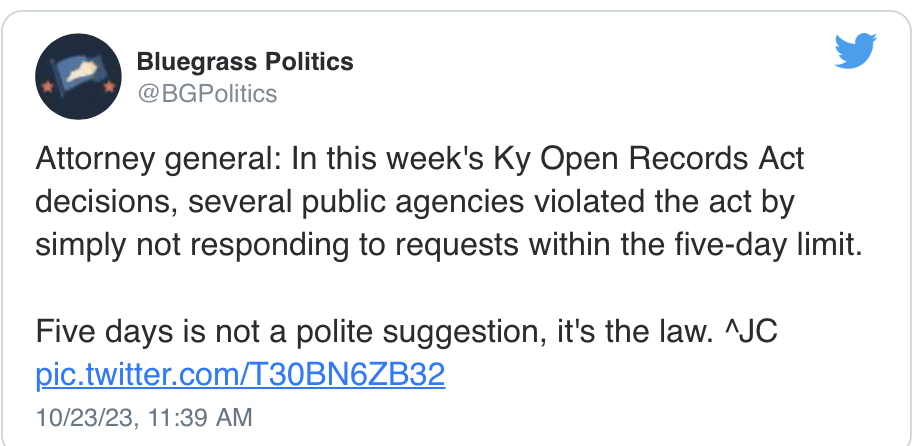
In a recent tweet, Bluegrass Politics commented on the weekly open records/open meetings press release issued by the Office of the Attorney General:
"In this week's Ky Open Records Act decisions, several public agencies violated the act by simply not responding to requests within the five-day limit.
"Five days is not a polite suggestion, it's the law."
This is true of the five business day deadline as well as every other requirement of the open records law. The Kentucky Court of Appeals eliminated any doubt in 2016 when it declared:
"The Open Records Act is neither an ideal nor a suggestion. It is the law. Public entities must permit inspection of public records as required or risk meaningful punishment for noncompliance. Rigid adherence to this stark principle is the lifeblood of a law which rightly favors disclosure, fosters transparency, and secures the public trust."
https://caselaw.findlaw.com/court/ky-court-of-appeals/1726554.html
But a regulation promulgated in the 1995 unintentionally incentivized public agencies to ignore that deadline by authorizing the Attorney General to "decline to issue a decision" in an open records appeal "if the requested documents are made available to the complaining party after a complaint is made."
https://apps.legislature.ky.gov/law/kar/titles/040/001/030/
Unfortunately, there were virtually no adverse consequences for public agencies that stonewalled open records requesters by ignoring their requests or perpetually extending the deadline for records production -- not even a slap on the wrist from the Attorney General in a terse open records decision finding a procedural violation. Public agencies -- like Louisville Metro and its police department-- regularly engaged in this conduct as standard operating procedure.
This changed at some point in the Cameron administration. To the office's credit, it ceased "declin[ing] to issue a decision" in an open records appeal "if the requested documents [were] made available to the complaining party after a complaint is made."
Although Cameron never explained this change in policy, it likely coincided with a little noticed, but exceedingly important, 2021 amendment to the open records law.
That amendment, sponsored by Senator Adrienne Southworth, added to the list of appealable agency misconduct -- constituting subversion of the intent of the open records law "short of denying inspection" -- "delay past the five day period [for agency response to a records request and/or] excessive extensions of time."
https://apps.legislature.ky.gov/record/21rs/SB201.html
https://apps.legislature.ky.gov/law/statutes/statute.aspx?id=51394
(See subsection (4))
(Whatever our differences with her on unrelated subjects, Southworth proved her sincere commitment to open government with this very practical, but largely ignored, amendment. For what it is worth, she also vehemently opposed the 2021 legislation excluding the General Assembly and Legislative Research Commission from the open records law. See, https://apps.legislature.ky.gov/record/21rs/hb312/vote_history.pdf).
Ironically, not long after the AG issued an open records decision in an appeal based on its failure to respond, Louisville Metro hauled the successful appellant into court based on one of these adverse rulings.
In Louisville Metro v Lawrence Trageser, the Jefferson Circuit Court rejected "Louisville Metro’s argument that the Attorney General should have found Mr. Trageser’s appeal moot and declined to issue an opinion in the matter under 40 KAR 1:030 § 6.
The court reasoned:
"Metro’s position is unreasonable because 40 KAR 1:030 § 6 cannot override the AG's duty under KRS 61.880(4) to provide an adjudicatory process to any person who 'feels the intent of [KORA] is being subverted by an agency' including by a 'delay past the 5 day deadline.'"
"Metro’s position is also unreasonable because it would allow any agency to extend the 5 day requirement unilaterally by forcing a requester to file a complaint with the AG before responding to his request for records."
Precisely the problem with procrastinating public agencies until Southworth's amendment was enacted into law and the Attorney General changed course.
The postscript to this unlikely tale of public agency overreach and arrogance?
Trageser requested, but was not awarded, attorneys fees. The case is, I believe, on appeal.
Having been so wrongly hauled into Court by a notoriously recalcitrant public agency that had clearly violated •state law•, Trageser was left to pay his own attorneys fees.
This brings us back to Bluegrass Politics' tweet (which echoes the Kentucky Court of Appeals):
"The Open Records Act is neither an ideal nor a suggestion. It is the law."


